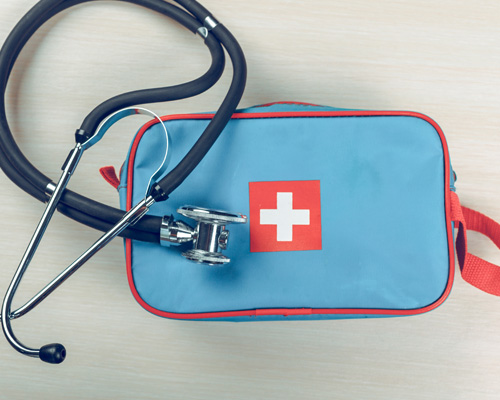-
-
Phone 289-748-2450
Do you know the 8 essentials in your travel kit?

To organize your travel first aid kit, you need to take into account some aspects, all of which are very important. It is an essential element, whether your absence from home is going to be brief or prolonged, since it saves you from many unforeseen events. Let's review together everything it should contain.
How should a travel first aid kit be?
Ideally, you should choose a cosmetic bag that is not very large, but in which everything fits. It is better that it be a light and practical object to use, with zippers and pockets. It must not be left within the reach of children and the contents must be protected from heat and humidity, which could alter the medicines. If you are traveling by any type of public transport, do not send it as luggage: always carry it with you.
What you put inside will depend on the people who are going to travel, whether they are children, the elderly or adults, and if someone who needs some treatment is going with you. In the latter case, it is convenient that you bring the pertinent medical reports, always updated.
Periodically review all items, discard those that are in poor condition and also expired drugs or those that are no longer being used. Calculate the amount in such a way that it is enough for the entire trip and something more, for any eventuality. Do not remove the blister packs from their boxes, as they contain the enclosed prospectus and the identification of the medicine, as well as the expiration date.
In addition to medications, a travel kit will contain other supplies, as we will see below. It is appropriate to place some items there to heal wounds, such as bandages, band-aids of different sizes, adhesive tape, sterile gauze and some antiseptic for the skin. A thermometer will also be useful, as well as scissors and some refreshing eye drops for irritated eyes.
What to put in a travel kit?
It is convenient that you be guided by the generic names, since the commercial ones usually vary from one country to another. There are even several different ones for the same product, depending on the manufacturing pharmaceutical company
1. Analgesics and anti-inflammatories
The most normal thing on a trip is to have a headache or a backache, which spoils the fun. Carrying paracetamol, ibuprofen or aspirin tablets can solve the problem immediately, without major consequences. Anti-inflammatories are useful if there is someone with joint pain.
2. Antihistamines
Allergies can easily show up when traveling, when we tend to lay back and forget precautions. Allergic rhinitis is common in the summer and it is convenient to take medication to counteract it and avoid its annoying symptoms, such as photophobia and runny nose. In this eventuality, nasal decongestant drops or tablets can be very convenient.
Do not forget that the bites of some insects can also trigger allergies, so you can bring ointments that contain antihistamines, with which you will relieve itching immediately.
3. Flu
The flu appears when we least expect it, with its sequel of general malaise and respiratory illness. You can choose different formats of flu medicine for your travel kit, such as tablets or effervescent tablets.
4. Antacids and carminatives
Overeating is the norm on travel, especially if you visit places with enticing local cuisines. The heaviness and discomfort after a large meal may require taking a carminative, which will help to eliminate them. Antacids can be helpful when there is heartburn or reflux of gastric contents into the esophagus, which sometimes happens with spicy foods or alcohol.
5. Laxatives
Constipation is another problem that often occurs when traveling. The different diet and the water of different characteristics favor it. On the other hand, the intestinal reflex necessary for evacuation to occur can be temporarily inhibited by changing the environment. A mild laxative will do the trick.
6. Medicines for diarrhea
Traveler's diarrhea is another problem that occurs when changing diet and drinking water. Probiotic medicines can help you treat this type of diarrhea, since it has been shown that some probiotic strains can reduce diarrhea and help us recover damaged and imbalanced intestinal flora.
7. Seasickness
Traveling in any type of vehicle, be it a boat, plane, car, train or bus can cause very annoying and even disabling dizziness. In the same way, some activities like rowing or kayaking, or riding the machines in theme parks, can trigger them. Children are particularly susceptible to this disorder, and it is advisable to administer motion sickness medication before embarking on the trip or starting the activity.
8. Take care of the skin
We already talked about insect bites, and to avoid them in places like the countryside or the beach, it is best to apply a good repellent. This way you avoid not only comedones and itching that accompany them, and which can be unbearable, but also the diseases that these vectors transmit and a possible allergy.




